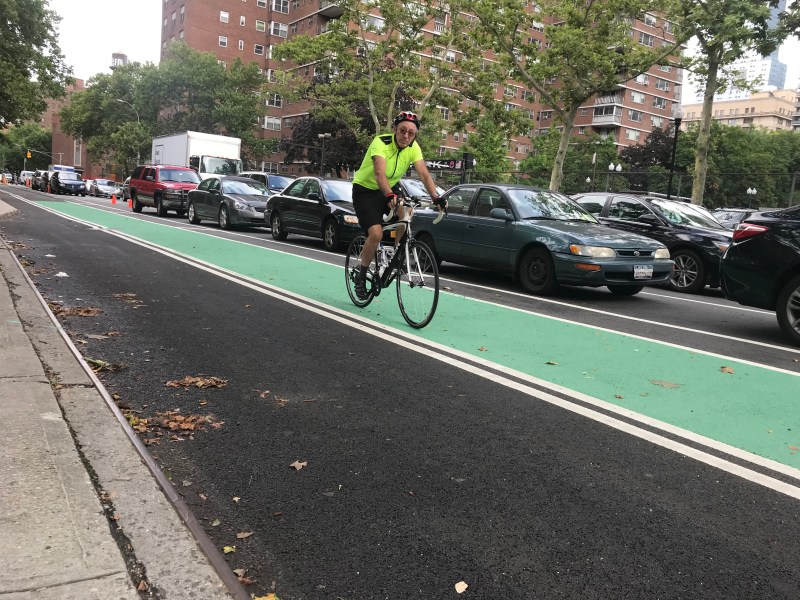Cyclists Demand More Bike Lanes, Less Community Boards and Even Some Roads of their Own

One hundred miles of protected bike lanes in two years. No cars on some key routes for cyclists. Lower speed limits. Less engagement with community boards. And no more delays in life-saving road redesigns “for non-transportation-related political reasons.”
Those are just a few of the demands made by the leaders of 13 street safety groups, led by Transportation Alternatives, as Department of Transportation Commissioner Polly Trottenberg finalizes a “bicycle safety plan” for its expected release next week. The groups’ July 17 letter to Trottenberg, obtained by Streetsblog, is the latest effort to influence the commissioner, who has been tasked by Mayor de Blasio to reduce fatalities in a year with 15 cyclists deaths so far.
“We believe Mayor de Blasio’s administration … must substantially deepen the commitment to policies and plans which would bring sweeping changes to our streets, rather than continue the current practice expanding bike lanes to a select few streets each year,” the letter states.
Even as it offers a constructive seven-point strategy for road safety, the groups’ frustrations seep into every paragraph, saying, for instance, that cyclists and pedestrians are “fed mere scraps of the road” as drivers enjoy a feast of public space, and calls some community boards “the greatest impediment” to road safety.
“Bicyclists in New York fear for our lives every time we ride,” the letter says.
Like a similar compendium of good ideas put forward last week by Streetsblog’s kitchen cabinet of experts, the groups’ letter admits that DOT cannot eliminate fatalities all by itself, but will need the help of multiple city agencies. But the letter focuses on items entirely within DOT control.
Here are synopses of the seven recommendations, with the full letter embedded below.
- Build 100 miles of protected bike lanes in two years and close all gaps in the existing bike lane network: “The overwhelming share of protected bike lane mileage [is] in Manhattan south of 110th Street. … Most of [the existing] segments remain isolated from a connected network of protected bike lanes and reach a tiny fraction of the city’s population.” So the city must:
- Finish the Queens Boulevard bike lane and restore the protected bike lanes on Dyckman Street, both of which have been ‘held up by City Hall since 2018 for non-transportation-related political reasons.”
- Close gaps in protected bike lanes, especially on Second Avenue in Manhattan near the Queens Midtown Tunnel.
- Start converting all unprotected painted bike lanes into protected lanes.
- Fix deadly intersections: “Starting immediately, every intersection along bike routes should be redesigned with at least one of the following three design features:
- Daylighted intersections
- Offset intersections
- Protected intersections
- And intersection cameras should also be piloted to protect pedestrian and cyclist right of way.”
- Automatically redesign streets after any death or serious injury: “This procedure should be understood as the emergency measure it is, and designed for speed of implementation and maximum efficacy in
terms of safety.” - Create a bike corridor pilot: “Bikeway corridors on high bike-traffic corridors [will] eliminate conflicts and send the message that cyclists and cycling belong on NYC streets.” Cars would only be allowed on such bikeways if they were registered to residents of the street in question. The group proposes Bergen Street between Flatbush Avenue and Court Street in Brooklyn as a “prime candidate for such a pilot” because it is a key route to the Manhattan and Brooklyn bridges where bikes often outnumber cars.
- Change DOT’s approach to community engagement: “Life-saving redesigns of City streets for all New Yorkers are routinely sacrificed in order to appease a car-owning minority,” the letter says. “This sacrifice of safety is unacceptable and must end. … Local officials and institutions like community boards should be seriously engaged in consultation on how to make streets safer, but not be granted a veto over whether streets are made safer.” (That’s a particularly timely demand, given that a pro-car Queens community board member said on Wednesday night that pedestrians “deserve to get run over” when they’re talking on their cellphones.)
- Build better bike lanes, not simply more bike lanes: “While the expansion of painted bike lanes may have played a role in the development of cycling in NYC in the past, it’s unclear today that new painted lanes are generating new bike trips. … We note that DOT in fact often justifies new paint-only lanes in terms of traffic calming — or the political expediency of creating a ‘starter pack’ now, for greater development years down the line — rather than bike trip generation or cyclist safety specifically.”
- Support key council legislation, including the Reckless Driver Accountability Act; Council Speaker Corey Johnson’s Transportation Master Plan; a proposal to build 100 miles of protected bike lanes per year, several bills to reform the dangerous private sanitation industry; and one to end the stipulated fine program, which gives delivery companies discounts on their parking tickets.
The letter was signed by:
- Marco Conner and Ellen McDermott of Transportation Alternatives
- Jon Orcutt of Bike New York
- Hindy Schachter of Families for Safe Streets
- Terri Carta of the Brooklyn Greenway Initiative
- Hilda Cohen of Make Brooklyn Safer and Kidical Mass NYC
- Chantel Hardy of WE Bike NYC
- Claudia Corcino of Ciclistas Latinomericanos de New York
- Cristina Furlong of Make Queens Safer
- Eric Zoundi of New York Pedicab Alliance
- John Tomac of Bike South Brooklyn
- Eric McClure of StreetsPAC
- Brendt Barbur of the Bicycle Film Festival
- Matthew Nidek of InTandem
- Sanja Wetzel of NightCAP Brooklyn
- Josh Bisker of Mechanical Gardens Bike Co-Op
- Allan Friedman of the Five Borough Bicycle Club
- Nick Sifuentes of the Tri-State Transportation Campaign
Bike Family Cyclist Deaths Crisis Letter by Gersh Kuntzman on Scribd





